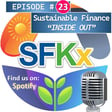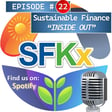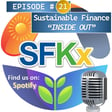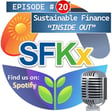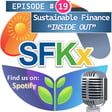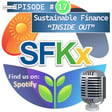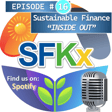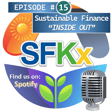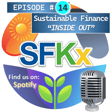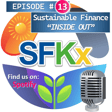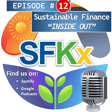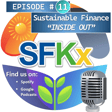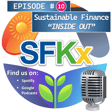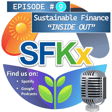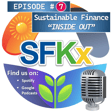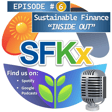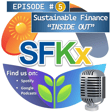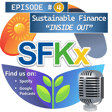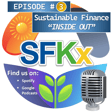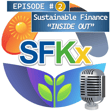Become a Creator today!Start creating today - Share your story with the world!
Start for free
00:00:00
00:00:01

SFKx Podcast Ep.8 - Sustainable Finance "Inside Out"
Transcript
Introduction and Podcast Mission
00:00:10
Speaker
Hello and welcome again to the 8th edition of SFKX Sustainable Finance Inside Out Podcast. Actually in bingo, I think episode 8 or number 8 is what they call a fat lady I've been told. So just a bit of left field fun facts for everyone. Anyway, we're getting up towards double figures pretty soon. So stay
Humorous Transition to Sustainable Finance Themes
00:00:31
Speaker
tuned. But as always at SFKX, we strive to bring you the latest news, events, major breakthroughs and key concepts as they happen anywhere in the world, region,
00:00:40
Speaker
or country. As I say a quick podcast is a good podcast so without any more delay I'm going to pass you over to my good friend SFKXGuru and he'll bring up the speed on everything around what's going on in the market. SFKXGuru, over to you, good serve.
00:00:57
Speaker
Thank you SF DJ. And I didn't realize you were such a bingo fan. Maybe some of that turkey you were consuming over the Christmas period has gone to your head. So good morning, good afternoon, good evening to all of our listeners.
Reflections on COP Themes and Future Outlooks
00:01:12
Speaker
We have had a few weeks this year is raced by and a few issues and technical issues of trying to get this episode out. So we appreciate those who have been hanging with Bated Breath for our next
00:01:26
Speaker
episode which obviously you're hearing now and the next one will be following up pretty fast as long as my computer behaves itself. So what I wanted to do SFDJ was just sort of recap and it's actually a good time that we've had some delays because we can look back over the COP
00:01:44
Speaker
sort of period and our next podcast will be what to look for or a bit of an outlook for 2024. But it's interesting that COPS been two or three months ago now and we can sort of look back at some of the key themes there and then see how many of them are going to carry forward into our sort of outlook.
Exploring COP Themes: Renewable Energy and Transition Finance
00:02:03
Speaker
So this this is kind of a funny
00:02:05
Speaker
sequence but I think will work well for our podcast I look I think we saw lots of things they're tripling of renewables doubling of energy efficiency that's all good cuz their mainstays in terms of sustainable finance agree well and truly on the agenda first time health's been included a cop
00:02:22
Speaker
um health the e the s the combination thereof we've been talking about the podcast for a while good to see these things actually manifest at high level and then they start to filter out in terms of disclosure requirements commitments um and it's good at least cop gives us a view as to what to look forward to um what else have we got here lots about transition finance
00:02:45
Speaker
lots about blended finance, lots about just transition, loss in damage, what are we calling it, scaling down, phasing down and all the rest of it, at least fossil fuels as well and truly in the text could have been done better. But anyway, there's lots of things and I think a lot of that we'll just see more of as we move into or keep progressing through
00:03:12
Speaker
I'm just having a look at another summary. Again, health, we talked about, agrees on the agenda, renewables, energy efficiency, loss and damage, gender, transition finance, blended finance, hydrogen, methane, nature, all of that good stuff. So I don't think anything necessarily, necessarily new.
00:03:35
Speaker
Let's have a look through resilience, adaptation, again we need it.
Taxonomy's Market Impact and Carbon Credits Discussion
00:03:39
Speaker
Taxomania continues to spread. That'll just help underpin confidence in the market with more agreed terms. Hard to abate sectors. Transition we talked about. Adaptation we talked about.
00:03:53
Speaker
Carbon credits was probably one area that wasn't addressed enough and I think we'll see that in our outlook episode. Something that we expect to see more of even though article six and the more the internationalization of those carbon markets didn't really go anywhere to be blunt.
00:04:09
Speaker
So let's sort of move on from that. I really like the Singapore taxonomy which came out just before Christmas.
Singapore's Taxonomy as Innovative Solutions
00:04:17
Speaker
Really well structured taxonomy in terms of transition areas, in terms of coal buyouts, which can be pretty controversial in some quarters. Singapore's also coming back to carbon credits.
00:04:28
Speaker
still looking at under the traction initiative, carbon credits for the avoidance of emissions due to coal, coal buyouts. And I think those things are pretty cool because they can be used in other industries, even though they are sort of pilot stage and there's some difficult things to work through. Something to look out for over the year, harder to abate sectors, shutting things early, avoiding massive emissions
00:04:53
Speaker
And there's no probability rate. It's 100% probability. If you're producing four, five, six, seven, eight, 10 million metric tons a year of emissions and you stop it, that's clear rather than CCS. Does it work? Does it not? So I think there's still some value and more to play out in terms of that more innovation space. And you're starting to even hear more of innovation finance, which I think is going to pick up blended transition.
Innovation Finance and Sustainable Finance 2.0
00:05:20
Speaker
and just keep mashing it together as we get onto sustainable finance 2.0, 3.0, getting into much more difficult areas and much more areas that are like, should we, shouldn't we? At least some more things are happening and that debate can then happen.
00:05:36
Speaker
Lots of news about blue themes, the ocean, SLLs hopefully roaring back over 2024, commodity traders on the agenda, a few interesting deals done for those. Timber Town was an interesting article I got from Bloomberg and I think SFDJ Timber, we can try and say a joke about that or we don't like cutting trees down on this podcast but anyway. No, I was going to say it's not the appropriate thing to say.
00:06:05
Speaker
We could say that, but a bit more fun than the bingo you referenced earlier in the podcast. But just interestingly enough, you know, wood, it's coming on the agenda. There's articles from Tokyo, there's articles from the Nordics about wood being used for high rises and other types of things. So look, we're going to see more interesting substitutes.
00:06:23
Speaker
Let's see what happens there. What else have we got
Global Initiatives: Energy Transition and Hydrogen
00:06:28
Speaker
here? ISSB, again, more on the disclosure side. Miners, what are they doing? What are they not doing for sustainable finance? Interestingly enough, China implemented more than the US has ever done on renewables just in one year.
00:06:43
Speaker
Hydrogen subsidies, hydrogen hubs, hydrogen banks, hydrogen contracts for difference, all things hydrogen really starting to explode across different markets, which is great. What else have we got here? Just energy transition partnerships, more happening in Indonesia and Vietnam, so we'll see how those go.
00:07:04
Speaker
I was going to say water, but I guess that's not what we say. If we cut down a tree, we know we say timber, water. I don't think there's a bingo letter, but water. Another interesting article from Bloomberg, the water trade is booming and sucking Australia dry. I think water is just this whole issue of beyond decarbonisation is really important.
00:07:25
Speaker
We know that there's social issues and we know that there's other environmental issues and water even more critical than decarbonisation for some industries. So good to see that getting some headlines. What else have we got here? TNFD, Task Force for Nature-Based Financial Disclosures. Loads coming out in terms of tips on particular industry guidance, footprinting guidance, sector guidance.
00:07:50
Speaker
Do check those out. The SEC warming up in terms of their disclosures on scope 3s and other things.
Biodiversity Credits and Climate Adaptation
00:08:00
Speaker
A little bit more on biodiversity credits. Again, I don't think we're going to see a biodiversity offset market. It will be more corporates that want to buy into and support
00:08:09
Speaker
New biodiversity initiatives, let's see. There's enough issues on the carbon markets, let alone something more innovative than biodiversity. So good to see quite a few articles about that. Not enough on climate adaptation. Not enough on how to fix carbon markets. CCUS, like hydrogen, getting a stack of press.
00:08:30
Speaker
And we mentioned those points related to hydrogen before, but CCUS carbon capture utilization. Again, all these things about government support, about harvest, some huge projects mentioned in the press. So let's see those key transition technologies get a bit of a run on this
Climate for Debt Swaps in Emerging Markets
00:08:51
Speaker
year. A little bit more on climate for debt swaps. Again, some countries normally in the emerging markets not having to fully repay their debt or restructure their debt.
00:09:00
Speaker
on the basis that some of those investors change hands and allow a bit of a haircut based on the assumption or commitment that certain environmental protections conservation we put in place. Let's see if more of those are done over the year.
00:09:16
Speaker
We'll talk more, I guess, probably next podcast in terms of some more of the outlook for the Pacific instruments. But look, the market was pretty flat, sort of made up a little bit of ground towards the end of last year. We saw most of the pressure actually in the market around sustainability link loans, which you mentioned a couple of.
00:09:38
Speaker
a couple of podcasts ago, and I think some of that is just cyclicals. I expect a bit more of that this year, and green loans were certainly down.
ESG Ratings: New Regulations and Criticism
00:09:48
Speaker
Some of the other bond products pretty flat, but we will talk more. Organizations like Moody's are talking about $900, $950 billion for the sustainable, mainly bond markets that happened this year. So that's a bit of an uplift, but we know there's plenty of uncertainty around
00:10:03
Speaker
sort of rocking the markets there. ICMAS come out with a new regulation code of conduct for ESG rating so they continue to get bashed from all directions and I think that's a good
00:10:20
Speaker
thing that we really strive for more accuracy in those, more transparency in those. Even though they may differ, at least the transparency connected to that, what they stand for, how they're calculated, and really have some strictness about how they should work.
00:10:39
Speaker
is very good. I can hear some echo there SF DJ, you might have your bingo app open there, but let's
Decarbonizing Chemicals: Methods and Articles
00:10:49
Speaker
continue. Really good couple of reports I've seen, I think S&P and also Climate Bond Initiative come out with great reports about decarbonizing chemicals, again, using things like energy efficiency, electrification, low carbon feed stocks, carbon capture, some of those a little bit more
00:11:06
Speaker
into the distance and I like the way that some of these things have been put forward in the recent transition articles I've read from starting energy efficiency reduce what you use if you can't reduce those emissions or use less power you move to
00:11:26
Speaker
Where do we start with energy efficiency? And then you move to electrification. What you can't do by electrification, you might try and do by hydrogen. What you can't do with hydrogen, you seek the carbon capture. So I like some of the hierarchy thinking in some of the recent articles I've seen, but more needs to be done.
00:11:46
Speaker
on chemicals in terms of both efficiency, in terms of feed stocks, in terms of thermal heat, in terms of the capture. We could say those issues are front and center for a lot of those hard to abate sectors. A couple more things
Energy Cluster Alignment Report Insights
00:12:00
Speaker
to mention SFDJ for our listeners, please don't forget to check out on a periodic basis, the transition pathway initiative have come out with an energy cluster alignment report
00:12:13
Speaker
Not great news on that. Pretty sober reading. Oil and gas is probably worse. Utility is not so good. In terms of looking at both management indicators and then actual decarbonisation performance, do check those.
00:12:29
Speaker
Our friends at Climate Bonds have been pretty busy again and came out with an interesting couple of components for Climate Bond Standard 4, where they go into R&D in a fair bit of detail, again, an accepted part of the market, but you don't see too many bonds or loans fully allocated on a user proceeds basis, all to R&D. CBI has had a bit of a 5%, this buffer also in the EU, Green Bond Standard, which has progressed and hopefully is fully operational by end of 2024.
00:12:59
Speaker
So some interesting aspects there. Agriculture report in Brazil by CBI and also SPTI, Science Space Target Initiative, looking for people to really work on their oil and gas standards. So we'll see what happens there. So a bit of an interesting spattering of news.
00:13:16
Speaker
there from from COP to some few other themes and I look forward to our next podcast when we can talk about what are the things we're going to look out to again COP provides a basis for some of that and then there's a few issues um but it's it's interesting that some of the COP themes come and sort of go and then by the time we get round to Jan Feb of the year we're sort of into other things so yeah that's a bit of a few of the highlights um SFDJ back to uh back to you
00:13:45
Speaker
Thanks, SF Guru. And apologies for some computer issues there before. You might have heard a couple of background noise. But thanks for that summary. And I do wish to have a wood joke for you, actually, if you wanted to run a party just quickly. I hope it's better than your bingo, Gags. So go ahead. Not promising much. It's quite a relevant joke considering our topic of our podcast. But why would you go to the bank with a bag full of wood pieces, SF Guru?
00:14:14
Speaker
Well, if it's sustainably sourced biomass, which you're referring to as wood, possibly there's a waste to energy opportunity at the bank, or is that too much of a nerdy answer? Way too much. The reason why you'd go to the bank with a bag full of wood pieces would be to open up a shavings account. So I'll just leave that one with
Linked Instruments and Market Movements
00:14:31
Speaker
you to mull over. Please open your bingo account and get back into that one.
00:14:38
Speaker
Look, on that note, let's keep the momentum going. Let's not beat around the bush too much or fluff around the edges as the saying goes. So let's keep things ticking along. Onto linked instruments. Give us some recent highlights please SF Guru on linked instruments.
00:14:53
Speaker
Yeah, so look, a couple of things, and I think the SLL market will sort of roar back into life this year with a few cyclical things sort of moving, but a couple of recent deals, Thai Union, some interesting transactions have been done, another SLL there on surveillance of their fleets for fishing that are externally managed and GHGs, Portuguese construction company, Moto Engil, mainly around emissions there, ETI,
00:15:23
Speaker
Turkish sort of food company, so a little bit of a European flavour through there. Scalar or Scala, a multimedia company looking at some things there presumably around energy efficiency. Kinetic, which is a charges and controls company, again heavily emissions focused.
00:15:43
Speaker
IXM, base battles and commodities. I think one thing to really take away is more the sector. I mean, as we know, 70% of KPIs for linked is really around GHGs, 10% other environmental, 10% social, 10% sort of gender. I think that's about 100% or so.
00:16:01
Speaker
TFI on the retail side, Mundis as a holdco. Again, good to see some holdcos getting done. Haven't seen as many funds structuring SLLs as previously done. Poseidon principles for PB shipping getting used on a nautical mile emissions basis there. AC Energy doing some cool stuff.
00:16:22
Speaker
I should say AC Corp, IELA over on a group basis, I believe, over in the Philippines. Sato Corporation, which is auto ID and barcodes, which you know you're a big fan of there. SFDJ and Standard Bank. Again, a lot of the deals we're seeing on the financial side of LinkedIn are really deals masquerading as LinkedIn deals when they're essentially counting
00:16:47
Speaker
use of proceeds loans. So anyway, we'll let others draw the conclusions to that. And hopefully we see more financial institutions issued in Lynx format that go a bit more direct to carbon or decarbonisation of the portfolio performance done there. So that's on the Lynx side, SF DJ. Thanks again, Mr. Guru for that summary. And of course, Standard Bank being a South African banker, they're playing some good cricket at the moment, the South African cricket team just making that point.
00:17:16
Speaker
SF Guru but I digress once more but now what we normally do with this part of the podcast is move on to use of proceeds. So can you please take us through some of those highlights please SF Guru.
00:17:29
Speaker
I certainly can. This has probably been the most random podcast we've ever done with some references to bingo trees and South African cricket teams. But yeah, use of proceeds. Look, I think sovereigns continue to be a strong power, a strong underlying issuer in the market, banks as well.
Role of Sovereigns and Banks in Market Issuances
00:17:51
Speaker
So most of the summary will be around that, Slovenia, Romania,
00:17:55
Speaker
Colombia everyone with a yeah in their right in their name Africa Zambia getting a first green bond on their market there and
00:18:04
Speaker
What else have we got? Japan expected to come out with their transition bonds soon. Japan looking at a finance organization for some municipalities there. Bermuda, Hungary, even Australia. SFDJ, we're all based coming out with their framework and opinion, which is good to see. Belgium, Germany being active again.
00:18:28
Speaker
So sovereigns really important catalyze the market signal the market all those good things and banks somewhat as well. So banks you know broad frameworks broad support for corporates lots of cool stuff in those frameworks i see bc active again.
00:18:49
Speaker
I don't forget the rest of their name. I'm sure it's some fancy Italian name, which I can't say. Some Scandi Bankan, BT Group, Hellenic Bank, who one of our friends from university probably works at. What else we got here? Then if we look and start to move into, oh, a few more banks actually.
00:19:11
Speaker
I think that's where one of the Dracula lives, but anyway, keep moving. BCI did a securitized deal. Hong Kong launched a tokenized deal just in terms of using some technology to map and track those bonds there.
Property and Utilities Market Innovations
00:19:30
Speaker
What have we got at Dennis Bank? And Bank of China also, again, we've seen this a few times where a bank will come out.
00:19:38
Speaker
and issue a bond and it's not really a linked or a use of proceeds. It says we're going to raise money and all that money is going to pump into links to fund a portfolio of linked loans and we'll report on the impact of that. Rather than then relink it back to the coupon on that bond, I think it's more of a device to seek further transparency and that's pretty cool. So we saw that a couple of times over the last couple of years in Bank of China, work with a provider to
00:20:07
Speaker
to come out with that. Property side, again, if you look at sovereigns, if you look at banks, if you look at property and utilities, you probably end up getting 60, 70% of the market. Vassar Cronin on the property side, Vastida, urban development groups in Chengde in China, moving to the generally renewable sort of side of things, although there's been a little bit of nuclear for photons sprinkled around.
00:20:37
Speaker
and some of those projects are getting a little bit more interesting as we go. Mazda has done some very big hydrogen things on the utility side as well. A van grid, need more going into grids and transmission. Evadrola, EDC, AC energy, Bruce Power.
00:20:56
Speaker
back to that nuclear reference, Pacific Hydro, Saint Luca, all the other bunch of names I can't say. Tokyo Metro was active again, UPM on the building materials side, we saw Shandong, Interco on the recycling side, we saw Fondu, it's a special para facitiamate, oh my god, aviation side of an airport,
00:21:21
Speaker
um there and again airports are interesting and that they could do linked or they could do use of proceeds some of these industries you can sort of jump into both if you got the asset base why not often use of proceeds can be a bit more straightforward um and then linked you want to make sure you have a good and ambitious plan backing what you want to measure excuse me and how far you want to push that data centers we saw
00:21:46
Speaker
A little bit in the market again, Singtel dipped their feet in the market again, Equinex on the data center side, DFI Retail, I think I've actually mentioned already, Mitsui OSK, NYK even doing over the last couple of weeks more of a transition style loan for some of the change of its fleets to gas and other things on the shipping side.
00:22:08
Speaker
Shri Ram over in India doing some social labeled instruments there for their borrowers and Industrial Bank of Korea also did a gender focused social bond as well. So not too much directly labeled as social, but you can see
00:22:24
Speaker
that broad range across the market and good to see a little bit of securitization again, a little bit of tokenization, a little bit of structure and a couple of different things such as that kind of relinked bond that Bank of China did.
The Potential Comeback of Nuclear Energy
00:22:44
Speaker
I'll take a breath and SFDJ back to you to figure out what else we got to cover.
00:22:51
Speaker
Wow, you've certainly gone around the globe with that one, SF Guru. I reckon you've covered more countries than Bhutras, Bhutras, Gali would have done in his heyday. But anyway, we're at the point of the podcast now where we like to sort of answer a couple of questions that our bot, Murray, has sort of put to us. Now, you actually mentioned nuclear before in that previous update, SF Guru. So one question we had come to us was, the first one, will nuclear make a comeback? Can you give us a quick summary of that one?
00:23:19
Speaker
Yes, I think similar to my personal opinion, we are seeing it come back in Bruce Power over in Canada, probably I think last year or the year before coming out with something. I think we've seen EDF in France and a few issuers come out. We've even seen, and I'm pretty sure this is the case, a photon come out the last couple of weeks in terms of a framework, even for new nuclear. I personally think the bigger opportunity around nuclear is in
00:23:47
Speaker
small modular reactors or SMR rather than the huge nuclear plant that takes 10 years to set up and has a huge, huge carbon footprint and water footprint and generally is a lot more socially difficult to get done. The newer technology under the SMRs and then the fission.
00:24:07
Speaker
um I think sorry fusion fusion not fission fission is splitting fusion is fusing together I think these new technologies are just gonna make nuclear more module more small and more interesting to consider so I think it is making a comeback already and at the end of the day
00:24:24
Speaker
There's no real credible scenario that exists in the market that totally ignores nuclear. So whether we have an emotive thought on that or not, I think there's a lot of value in using it. And it's all just comes back to the waste issue. And it's just it's just impossible to have a perfect measure on that. So I think it is back already. I think it will continue to be dipped into in these markets. And I think we've gone from a refurb market now to an actually building out. But
00:24:53
Speaker
Further to that, small, modular, new tech, we'll see how that grows. So yeah, that's a long way of saying, yeah, I think we will. I think you've given us the right sort of a steal on that one. And then the second one, the final question was, hopefully I've got this correct, I've understood Murray correctly, but the question is, will we ever see the transition label?
Transition Labels in Finance: Standards and Funding
00:25:17
Speaker
Yeah, so I think, again, that's like the, we've seen green, we've seen social, we've seen linked. We've seen really only in Japan, instruments labeled as transition, which are generally use of proceeds. We've seen Ethead a couple of years ago do a transition linked, we've seen Caden, we've seen Sedan, we've seen a couple of other different types of companies label their framework as transition.
00:25:42
Speaker
But we haven't really seen that take off because there's no common standards. And I think because there's no common standards to that, even though there's a huge amount of reference points on what a transition plan should look like. And there's a bunch of taxonomies and taxonomies like the Singapore taxonomy help in terms of define well,
00:26:00
Speaker
What's a really brownish activity, if it meets a certain standard, we should back it, because it gets us closer. And I like to think of transition moving from brown to green. And really, that transition part of the market is going from dark brown to lighter brown. And that's still difficult for some people to stomach, but we need to do it. We need everything. We need dark green, light green, lighter brown, as long as it's not locking in fossil fuel related stuff for too long.
00:26:30
Speaker
We will see that. I've been saying it for probably two or three years. This is the year of transition.
00:26:36
Speaker
I reckon we're going to see a lot more finance for transition, but we're not really going to see much in terms of banks really shouting about that. It's going to be in their reports and their impact and their counting of the beans as to what they've done on sustainable finance. But I think there's a bit of a pullback in saying, look, should we label that as transition? I still think people should come out and label that as transition.
00:27:00
Speaker
and fund some of these harder things, and then we stimulate debate the market. Should it or shouldn't? If we're never doing those things and not debating it, I don't think it pushes the market forward enough. So will we ever see one? I guess what I'm saying is sort of, but we're going to see more transition activities funded, but I think we're going to see a bit of the yelling about that probably be tempered.
00:27:24
Speaker
But I would hope that we see a few transactions out there labeled as transition. So people start to get more comfortable that that still is the lighter brown rather than the lighter green or the dark green. And we need companies to be on that pathway and supporting that. So there you go. A couple of slightly woolly answers for you, SFTJ. I think that's a nice one. I mean, a little bit.
00:27:49
Speaker
sitting on the fence there as if guru, but as you say, likely maybe in terms of the label coming through. So that's all very good. Now we almost had our 30 minutes sort of soft, soft cutoff. We like to sort of keep things to around that half an hour block, which always works quite nice for a podcast. We do have just the last part of our, of our program, which is really funny enough the section on products and programs that integrates sustainability.
00:28:15
Speaker
Can you please maybe take us through this last... Certainly is, and I reckon now if you're busting to get off to your bingo class there. So I'm on the USFR. Excuse me SFDJ. But anyway, before we wrap up... You've picked it.
00:28:27
Speaker
Nothing entirely new for products and programs, a little bit more
Sustainability Products and Programs Overview
00:28:32
Speaker
of the same. Kind of cool to see some more Asia focused ESG bond funds from Amundi. We've seen a little bit more on Islamic related bonds and sharia products, good to see. And is to publishing some sustainability link derivative legal clauses. Again, good to see the market sort of dipping into these. And again,
00:28:55
Speaker
Some of these products are not huge impact in terms of isolation, but it keeps bringing back companies wanting to show what their money, where their mouth is, and have some different products connected to sustainability outcomes. And that surely can't be bad. And sometimes these things can deliver good debates. So that's really it in Project and Programs. And back to you, SFGJ, to take us out. Thank you, SFGOO. Well, that's a nice little wrap.
00:29:24
Speaker
Thanks for sticking through with us on episode number eight.
Conclusion and Final Remarks
00:29:28
Speaker
You can obviously find us at www.sustainablefinancekx or one word.com. So please follow us on there as well. I'll finish with a quick joke for you, SF Guru, a quick one. What is... I've been spending it in your earlier one, your shavings account. Now, this one's even better. What's Woody Woodpecker's favorite type of joke? Oh, God.
00:29:53
Speaker
I'll give you the answer. Woody Woodpecker likes those knock-knock jokes. So there you go. So anyway, I think that's a wrap. We will close the show. We better close off before our comedy gets to us. 30 minutes and 10 seconds, so we've done well. So that's a wrap, fellows and girls. Talk to you all soon.
00:30:23
Speaker
I'll see you next time!
